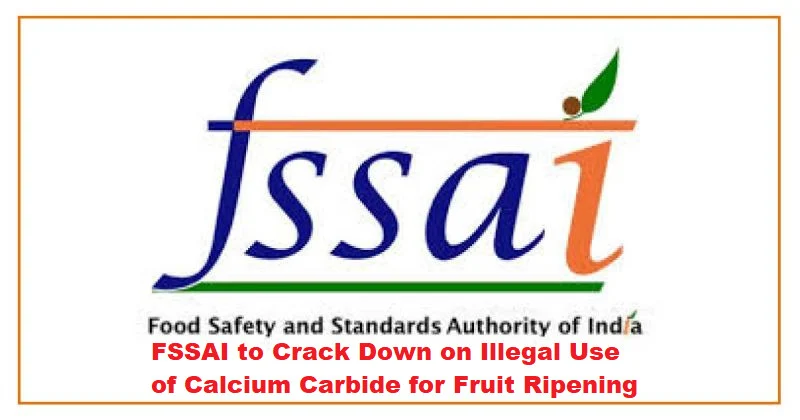FSSAI to Crack Down on Illegal Use of Calcium Carbide for Fruit Ripening
NEWS PRISM, DELHI NEWS BUREAU
NEW DELHI: The Food Safety and Standards Authority of India (FSSAI) has issued a stern warning to food businessmen, cautioning against the use of the banned ‘calcium carbide’ for ripening fruits. The regulatory body has urged the food safety departments of states and Union Territories to maintain vigilance and take strict action against those violating the directive, in accordance with the provisions of the FSS Act.
Calcium carbide, a substance commonly employed to hasten the ripening of fruits like mangoes, releases acetylene gas containing traces of arsenic and phosphorus, posing serious health risks. The FSSAI’s admonition comes in the wake of a petition before the Supreme Court, which has also sought responses from the Centre, the Ministry of Agriculture, and FSSAI regarding the use of hazardous chemicals in food processing.
“The use of the dangerous ‘calcium carbide’ in artificial fruit ripening poses significant health hazards,” stated an official from the FSSAI. “Traders, fruit handlers, and food business operators have been explicitly instructed to refrain from its use, particularly during the mango season.” Notably, ‘calcium carbide’ is colloquially referred to as ‘masala’.
The adverse effects of ‘calcium carbide’ consumption include dizziness, frequent thirst, a burning sensation, weakness, difficulty in swallowing, vomiting, and skin ulcers. Moreover, concerns over residues of arsenic and phosphorus left on fruits have led to the prohibition of its use under the Food Safety and Standards (Sales Prohibition) Act.
In light of the prevalent use of the banned calcium carbide, the authorities have permitted the use of ethylene gas as a safe alternative for fruit ripening in India. Ethylene, a naturally occurring hormone in fruits, facilitates the ripening process through chemical and biochemical activities. “Ethylene gas can be applied in concentrations up to 100 ppm, depending on the crop and variety,” noted an expert.
FSSAI’s Comprehensive SOPs on Safe Fruit Ripening Methods
To promote food safety and curtail hazardous practices, the FSSAI already published a comprehensive guidance document titled “Artificial Ripening of Fruits – Ethylene gas a safe fruit ripener.” These guidelines can be opened by clicking this link (https://www.fssai.gov.in/upload/uploadfiles/files/Guidance_Note_Ver2_Artificial_Ripening_Fruits_03_01_2019_Revised_10_02_2020.pdf) .This document aims to provide Food Business Operators with a standardized procedure for the artificial ripening of fruits using ethylene gas, a safe alternative to the banned and toxic calcium carbide. The guidance note outlines a detailed Standard Operating Procedure (SOP) encompassing various aspects of artificial ripening through ethylene gas. It covers restrictions, requirements for ethylene ripening systems/chambers, handling conditions, sources of ethylene gas, protocols for application from various sources, post-treatment operations, and crucial safety guidelines.
Furthermore, the Central Pesticide Board and Registration Committee have sanctioned Ethephon 39% SL for the uniform ripening of mangoes and other fruits, underscoring a concerted effort toward safer fruit processing methods.
In a stern warning, the FSSAI has also urged state food safety departments and Union Territories to maintain vigilance and take strict action against violators who continue to use banned ripening agents like calcium carbide, in accordance with the provisions of the Food Safety and Standards Act.
Consumers who encounter any instances of calcium carbide or other prohibited substances being used for artificial fruit ripening are encouraged to report such violations to the concerned State Commissioners of Food Safety. The contact details of all State/UT Commissioners are available on the FSSAI website (https://www.fssai.gov.in/cms/commissioners-of-food-safety.php).
The FSSAI’s proactive stance aims to safeguard public health and ensure compliance with food safety standards amidst growing concerns over the use of harmful chemicals in food production and processing.

